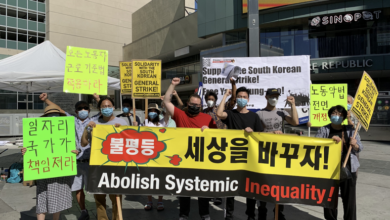South Koreans, mobilizing in mass against efforts by U.S. transnational corporations to force-feed them U.S. beef, may be headed for victory.
|
The present debacle goes back to April 18, the eve of a U.S.-South Korean summit meeting between South Korean President Lee Myung-bak and U.S. President George Bush. That day, the South Korean government lifted restrictions on U.S. beef imports put in place in 2003 after beef infected with mad cow was discovered in the United States. Until then, South Korea had been the third largest importer of U.S. beef.
The Lee government had promoted the lifting of restrictions as a necessary prerequisite for the signing of the U.S.-Korea Free Trade Agreement. Most South Koreans view the FTA as a pact that will put their country at the mercy of imperialist transnational corporations.
A poll conducted in South Korea on May 7 by Dongseo Research found that 82 percent of respondents were for renegotiating the U.S. beef import agreement. The widespread sentiment that U.S. corporations have no regard for the public health of South Korea helped spark a mass movement against the import agreement. By May 13, over 1.3 million people—3 percent of the population—had signed a petition demanding that President Lee resign.
A nationwide coalition of civic organizations was formed to protest the South Korean government’s compliance with U.S. corporate interests. The People’s Countermeasure Council against Full Resumption of Imports of U.S. Beef Endangered with Mad Cow Disease has been leading the struggle, calling for a series of nationwide protests against the pact.
The South Korean government’s initial response to the mass outpouring was to attack the demonstrations using high-pressure water canons to disperse the crowds, and beat and arrest protestors. Videos of the May protests on the Internet show the mass character of the movement as well as the government’s violent response. A 72-hour protest by tens of thousands from June 5 through June 7 battled police as many were brutalized and arrested.
The cabinet’s resignation offer and the decision to renegotiate the beef agreement reflect the magnitude of the political crisis brought about by the pressure of the mass movement. The present struggle has gone far beyond the confines of opposing an agreement on beef imports. It has broadened to reflect the South Korean people’s desire for self-determination, sovereignty and independence.






